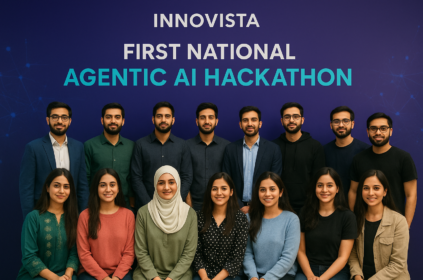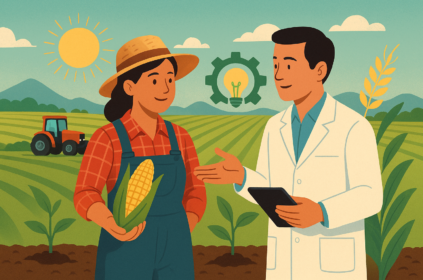In a world increasingly focused on combating climate change through innovative technology, stories of young trailblazers like Mahroosh Umer shine brightly. This Pakistani AS-level STEM student has not only put her country on the map but has also demonstrated how artificial intelligence (AI) can drive real-world solutions for global challenges. Leading a multinational team, Mahroosh secured first place at the prestigious AI4Good Incubator 2025 in Dubai, with her groundbreaking platform, AgriGuard AI. This achievement underscores the power of youth-led innovation in promoting sustainable farming and accelerating the path to net zero emissions.
If you’re passionate about AI for good, environmental sustainability, or emerging tech trends, this post dives deep into Mahroosh’s journey, the technology behind AgriGuard AI, and its broader implications. Let’s explore how one student’s vision is transforming agriculture and inspiring a new generation of innovators.
The AI4Good Incubator 2025: A Global Stage for Climate Innovation
The AI4Good Incubator 2025 is more than just a competition—it’s a high-stakes techthon designed to harness AI for positive environmental impact. Held over five intense days in Dubai, the event gathered hundreds of young innovators from around the world to tackle pressing issues like climate change. The central challenge this year? “How might we use AI to accelerate the journey to net zero?”
Competing teams brainstormed, prototyped, and pitched solutions that blend cutting-edge AI with practical applications. Amidst fierce global competition, Mahroosh Umer’s team emerged victorious, showcasing Pakistan’s growing prowess in STEM fields. This win is a testament to the incubator’s mission: empowering youth to create tech that addresses real societal needs, from reducing carbon footprints to enhancing economic resilience.
For those unfamiliar, AI4Good initiatives, supported by organizations like the United Nations and tech giants, aim to leverage AI ethically for social good. Events like this one foster collaboration across borders, turning ideas into actionable prototypes. Mahroosh’s success highlights how such platforms can amplify voices from underrepresented regions, proving that innovation knows no boundaries.
Who is Mahroosh Umer? The Young Pakistani Innovator Behind the Win
At the heart of this story is Mahroosh Umer, an AS-level STEM student from Pakistan whose passion for technology and environmental advocacy has propelled her to international acclaim. As a dedicated advocate for tech-powered change, Mahroosh focuses on using STEM to solve real-world problems, particularly those at the intersection of social justice and climate action.
Growing up in Pakistan, a country where agriculture employs nearly 40% of the workforce and faces severe climate threats like droughts and floods, Mahroosh witnessed firsthand the struggles of smallholder farmers. These experiences fueled her drive to innovate. “We wanted to make sure technology wasn’t just powerful, but practical—especially for smallholder farmers who are on the frontlines of climate change,” she shared in a post-event interview.
Mahroosh’s leadership shone through as she guided her multinational team—comprising talents from diverse backgrounds—to develop AgriGuard AI. Her role extended beyond ideation; she took charge of prototyping, ensuring the platform was user-friendly and impactful. This victory marks a milestone for Pakistani youth in global STEM innovation, reflecting the nation’s untapped potential in tech-driven environmental solutions.
Beyond this win, Mahroosh is setting a benchmark for aspiring innovators. She’s a role model for young women in STEM, proving that age and geography are no barriers to making a global impact. Her story resonates with ongoing efforts to promote gender equality in tech, as highlighted by initiatives from organizations like UNESCO’s STEM programs.
Mahroosh’s Journey: From Classroom to Global Spotlight
Mahroosh’s path to the AI4Good win wasn’t overnight. As an AS-level student, she balanced rigorous academics with hands-on projects. Her interest in AI sparked during school hackathons, where she experimented with tools like machine learning algorithms for environmental monitoring.
Leading up to the incubator, Mahroosh honed her skills in platforms like Glide, a no-code tool that democratizes app development. This expertise allowed her to rapidly prototype AgriGuard AI, turning complex data into intuitive interfaces. Her multinational team collaboration added layers of cultural insights, ensuring the solution was globally adaptable.
This achievement also spotlights Pakistan’s evolving tech ecosystem. With startups like TechJuice reporting on local innovations, the country is fostering a vibrant community of young coders and entrepreneurs. Mahroosh’s win could inspire more Pakistani students to pursue AI and sustainability careers, potentially boosting the nation’s role in global tech dialogues.
Unveiling AgriGuard AI: The Award-Winning Platform for Sustainable Farming
What makes AgriGuard AI a game-changer? This AI-driven platform empowers smallholder farmers with tools to adopt climate-smart agricultural practices. By integrating advanced technologies, it addresses key pain points in traditional farming, from soil degradation to unpredictable weather patterns.
At its core, AgriGuard AI uses satellite imagery and soil data to deliver hyper-local recommendations. Farmers receive actionable insights on improving soil health, optimizing crop yields, and even accessing income through carbon credits. This not only promotes sustainability but also turns eco-friendly practices into profitable ventures.
Mahroosh prototyped the platform using Glide, enabling interactive visualizations that simulate real-world farming scenarios. Farmers can input data via a simple app interface and get tailored advice, such as:
- Soil Health Optimization: Analyzing nutrient levels to suggest natural amendments, reducing reliance on chemical fertilizers.
- Crop Yield Enhancement: Predicting best planting times based on climate forecasts, minimizing losses from extreme weather.
- Carbon Credit Opportunities: Tracking sustainable practices to qualify for credits, providing additional revenue streams.
The platform’s uniqueness lies in its blend of cutting-edge technology, environmental stewardship, and economic empowerment. Unlike generic farming apps, AgriGuard AI is designed for smallholders in developing regions, where access to tech is limited. It bridges the gap between advanced AI and everyday agriculture, making data-driven decisions accessible to all.
How AgriGuard AI Tackles Climate Change Head-On
Climate change disproportionately affects smallholder farmers, who produce up to 70% of the world’s food but lack resources to adapt. AgriGuard AI directly counters this by:
- Leveraging AI for Precision Agriculture: Using machine learning to process vast datasets from satellites, providing forecasts more accurate than traditional methods.
- Promoting Net Zero Goals: By encouraging practices that sequester carbon, like cover cropping, it helps farmers contribute to global emission reductions.
- Empowering Communities: The platform includes educational modules, teaching users about sustainable techniques and fostering long-term resilience.
In tests during the incubator, AgriGuard AI demonstrated potential to increase yields by 20-30% while cutting water usage. This aligns with broader trends in agri-tech, where AI is projected to add $500 billion to global GDP by 2030, according to reports from McKinsey & Company.
For tech enthusiasts, the platform’s tech stack is intriguing. Built on no-code tools like Glide, it incorporates APIs for satellite data (e.g., from NASA’s Earthdata) and AI models for predictive analytics. This low-barrier approach makes it scalable, allowing easy updates with emerging tech like edge AI for offline use.
The Broader Impact: Inspiring Global STEM Innovation and Sustainability
Mahroosh’s win at AI4Good Incubator 2025 extends far beyond a trophy—it’s a catalyst for change. For Pakistan, it elevates the narrative of youth innovation, encouraging investments in STEM education. Globally, it showcases how AI can democratize solutions for climate action, particularly in agriculture, which accounts for 24% of greenhouse gas emissions.
This story also highlights the role of multinational collaboration. Mahroosh’s team, drawn from various countries, brought diverse perspectives, enriching the platform’s design. Such inclusivity is key in AI development to avoid biases and ensure equitable outcomes.
Looking ahead, AgriGuard AI could evolve into a full-fledged startup, partnering with NGOs or governments to deploy in regions like South Asia and Africa. Mahroosh’s advocacy work positions her as a future leader in AI for sustainable development, potentially influencing policies at forums like COP conferences.
Benefits of AI in Sustainable Farming: Key Takeaways
Adopting tools like AgriGuard AI offers numerous advantages:
- Increased Efficiency: Farmers save time and resources with precise recommendations.
- Economic Gains: Access to carbon markets can boost incomes by 15-20%.
- Environmental Wins: Reduced chemical use preserves biodiversity and soil integrity.
- Scalability: AI platforms can reach millions, amplifying impact in vulnerable areas.
If you’re in tech or agriculture, consider exploring similar projects. For instance, check out our related article on AI Applications in Climate Tech for more insights.
Challenges and Future Prospects for Young Innovators Like Mahroosh
While Mahroosh’s success is inspiring, it’s not without hurdles. Young innovators often face barriers like limited funding, access to mentors, or gender biases in STEM. In Pakistan, infrastructure challenges add layers, yet stories like this prove resilience pays off.
The future looks bright. With AI advancing rapidly—think generative models for crop simulations—platforms like AgriGuard AI could integrate VR for immersive training. Mahroosh’s win may spark more incubators focused on youth from emerging markets, fostering a pipeline of talent.
In essence, this victory reminds us that sustainable farming AI isn’t futuristic—it’s here, driven by passionate individuals like Mahroosh.















